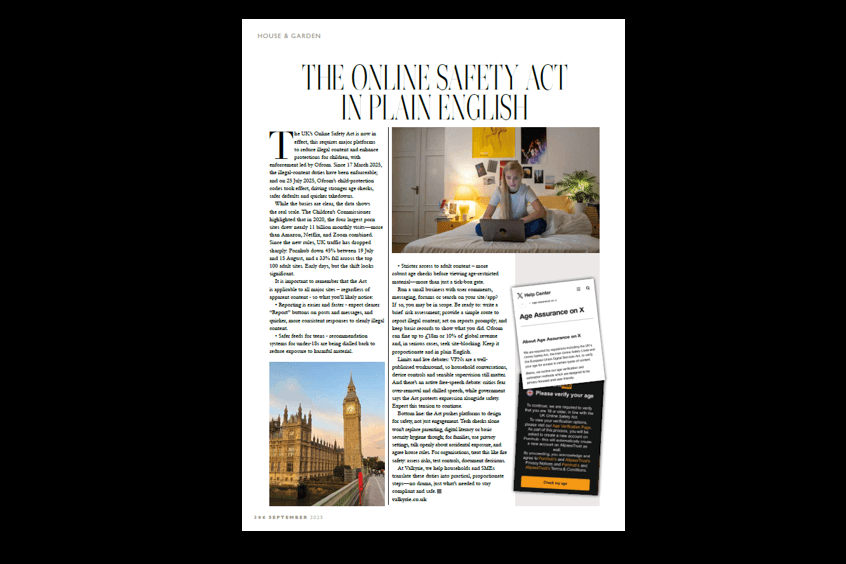The modern professional landscape includes five distinct generations, ranging from Traditionalists to Generation Z. This diversity presents organisations with the challenge of addressing a broad spectrum of attitudes, expectations, and needs among their workforce. Each generation brings unique perspectives and work styles, particularly when it comes to technology and security, making it crucial for organisations to develop strategies that are inclusive, adaptive, and forward-thinking. At Valkyrie, we see first-hand how this generational mix is influencing how businesses and family offices address security, highlighting the need for tailored solutions to mitigate risks across age groups.
-Traditionalists (born between 1900 and 1945) possess a wealth of experience and a disciplined work ethic. While many are now retired, those still active in the workforce or serving as the principal of a family office often require support to navigate modern technologies and updated security protocols.
-Baby Boomers (born between 1946 and 1964) are dedicated, team-oriented, and have witnessed significant societal and technological shifts. Although generally open to new ideas, they may need reassurance when adopting advanced security technologies, preferring solutions with a proven track record.
-Generation X (born between 1965 and 1980) is independent, having adapted to the rise of personal computing. They often blend traditional and contemporary approaches to work and security, valuing both flexibility and efficiency.
-Millennials (born between 1981 and 1996) form the largest segment of the workforce, known for their adaptability and mobility. While they are generally tech-savvy, they may lean towards convenience over caution, highlighting the need for structured cybersecurity training to encourage a more cautious approach to digital threats.
-Generation Z (born between 1997 and 2015) are digital natives, integrating technology into every facet of their lives. With high expectations for privacy and transparency, they can quickly adapt to digital security measures but may be less aware of the broader implications of data-sharing and potential cyber risks.
Cybersecurity Across Generations
Generational differences in technology familiarity significantly affect cybersecurity practices. Traditionalists and Baby Boomers may need focused training to understand emerging threats like phishing and ransomware, while Millennials and Gen Z may overestimate their ability to manage digital risks, leading to potential vulnerabilities. Additionally, younger generations’ quick adoption of new tools can introduce shadow IT risks, where unsanctioned apps or devices bypass IT controls. At Valkyrie, we emphasise the importance of bespoke cybersecurity training and clear technology use policies, ensuring all generations understand both the risks and the tools available to mitigate them.
Physical Security in a Diverse Workplace
Attitudes toward physical security measures can vary greatly. Older generations often see value in access controls, surveillance, and secure entry protocols, viewing them as necessary safeguards. Younger generations, especially Millennials and Gen Z, may prioritise personal privacy and express concerns over the invasive nature of certain security measures. A balanced approach is required—one that enforces strong security protocols while respecting privacy concerns, especially in a world where awareness of data surveillance is increasing. This is particularly relevant in remote work environments, where different preferences for security measures and remote access tools need to be addressed to maintain both convenience and protection.
Data Privacy and Ethics
Generational attitudes towards data privacy have evolved with technology. Traditionalists and Baby Boomers often place trust in established organisational data security measures, while Millennials and Gen Z, who have grown up amidst high-profile data breaches, are more likely to question how their data is managed. Businesses must adopt transparent data handling practices, ensuring that security measures not only protect data but also align with the privacy expectations of younger employees, fostering trust without compromising security.
Social Engineering and Cyber Hygiene Awareness
Generational diversity can influence vulnerability to social engineering attacks, such as phishing or impersonation scams. Older generations may be more susceptible to email-based phishing, while younger employees active on social media might be targeted through social media-based scams. Additionally, varying levels of cyber hygiene—such as using strong passwords and keeping software up-to-date—can leave gaps in organisational security. Tailored awareness programs that address the specific habits and risks of each age group are essential to maintaining a strong line of defence.
Security Culture
Creating a cohesive security culture that resonates across generations is essential, particularly in multigenerational environments such as family offices. Resistance to change may be common among older generations, while younger ones are generally more enthusiastic about adopting new technologies. Bridging these differences requires an adaptable approach, where security protocols are communicated clearly, reinforced consistently, and encourage collaboration across age groups. A unified security culture supports both physical and digital security efforts, reducing the risk of oversight or resistance.
Incident Response and Communication
Effective incident response requires understanding how different generations communicate during high-stress situations. Traditionalists and Baby Boomers may prefer direct, structured communication, while Millennials and Gen Z often expect transparency and real-time updates. Valkyrie advises organisations to tailor incident response plans to account for these differences, ensuring that all employees receive timely and clear information during a crisis, leading to a more coordinated and effective response.
Conclusion & Takeaways
The multigenerational workforce presents unique challenges and opportunities, especially regarding security. At Valkyrie, we recognise the importance of adapting strategies to meet the needs of all employees, offering tailored cybersecurity training, privacy-conscious physical security measures, and fostering a culture that bridges generational divides. These efforts ensure that both businesses and family offices can remain secure while creating an inclusive and responsive environment.
Key Takeaways:
Design cybersecurity training programs that account for varying levels of technological fluency, ensuring comprehensive threat awareness.
- Balance rigorous physical security protocols with privacy considerations to address the concerns of younger generations.
- Develop a security culture that embraces collaboration and transparent communication, empowering all generations to contribute to a secure workplace.
- Implement clear guidelines for remote work and technology use to prevent shadow IT risks.
- Tailor social engineering awareness programs to address generational differences in digital habits and vulnerabilities.
By recognising and addressing these generational differences, organisations can protect their assets and ensure that security strategies are effective and inclusive, no matter the age group.














